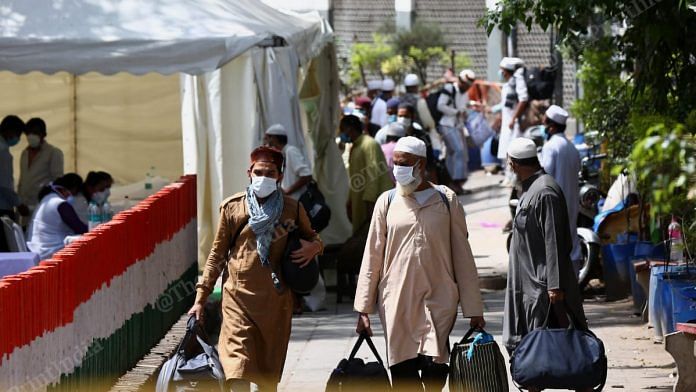New Delhi: The Bombay High Court Friday slammed the print and electronic media for the “big propaganda” against the foreigners who were a part of the Tablighi Jamaat congregation in Delhi’s Nizamuddin, which became a super-spreader coronavirus event.
In a strongly worded judgment, the Aurangabad Bench of the high court, comprising Justices T.V. Nalawade and M.G. Sewlikar observed, “There was big propaganda in print media and electronic media against the foreigners who had come to Markaz Delhi and an attempt was made to create a picture that these foreigners were responsible for spreading Covid-19 virus in India. There was virtually persecution against these foreigners.”
It then quashed the FIRs against 29 such foreigners, noting that there was no proof to show they had violated visa conditions and propagated Islam, or were responsible for the spread of Covid-19 in the country.
It also said that “a political government tries to find the scapegoat when there is pandemic or calamity and the circumstances show that there is probability that these foreigners were chosen to make them scapegoats.”
As for the state police, the judgment, authored by Justice Nalawade, said that the “Maharashtra police acted mechanically” and the “State Government acted under political compulsion”. It said that there was “non-application of mind” by the police and hence chargesheets were filed despite no prima facie evidence.
The court also quashed FIRs against six Indian nationals and the trustees of masjids who were accused of giving shelter to the foreigners.
The court was hearing several petitions demanding quashing of FIRs and chargesheets filed in these cases, mentioning various provisions of the Indian Penal Code, the Epidemic Diseases Act, Maharashtra Police Act, Disaster Management Act and Foreigners Act for allegedly violating their tourist visa conditions.
Also read: India may blacklist 300 foreigners who attended Nizamuddin event on tourist visas
No violation of visa norms
The authorities had alleged that the foreigners had come to India on tourist visas, but were found indulging in religious activity and “spreading Muslim religion by giving speeches in Masjid”.
The court, however, perused the visa manual and several circulars issued by the government. It then concluded that updated provisions on visas show that “there is no prohibition to such foreigners to visit religious places and to have religious discourse”.
It also pointed out that “even from the record, it cannot be inferred that the foreigners were spreading Islam religion by converting persons of other religion to Islam.” It further opined that the allegations against these foreigners were “very vague in nature”.
Citing Articles 25 and 21 of the Constitution, it then asserted that “such foreigners cannot be prevented from visiting Masjids, if they go there to observe religious practices or to offer only Namaz”.
Also read: Tablighis stuck in India even after plea bargaining as ‘surprise’ secondary FIRs surface
‘Cannot treat foreigners of different religions differently’
Citing Article 14 of the Constitution, the judges also asserted that the government “cannot give different treatment to citizens of different religions of different countries”.
“Article 14 of the Constitution of India shows that there needs to be ‘law’ as mentioned in this Article and for some object the classification can be made which needs to be reasonable. Such law can be subjected to the test of constitutional validity,” it observed.
The bench made the observation after noting that “many foreigners of other countries are sent back by the Central Government without making any inquiry”.
It also quoted the Sanskrit phrase, ‘Atithi devo bhava’ (Guest is god) and asked “whether we are really acting as per our great tradition and culture”. It asserted that amid Covid-19, instead of showing more tolerance and sensitivity towards our guests, “we lodged them in jails by making allegations that they are responsible for violation of travel documents, they are responsible for spreading of virus etc”.
The court also held the view that foreigners being given shelter in mosques cannot be illegal. It pointed out that due to hotels and restaurants being closed, arrangements were made by many religious places, including gurdwaras, for those stranded, including migrant workers.
As per the judgment, the government lawyer demanded that the operative part of the judgment be stayed, as the government may challenge this decision. However, the court refused to do so, pointing out that the procedures to grant permission to foreign nationals for their return and arrangements for flights would take time anyway.
Also read: Foreigners from Tablighi event won’t be charged with culpable homicide: Delhi Police to court



